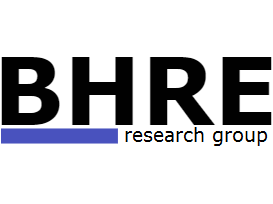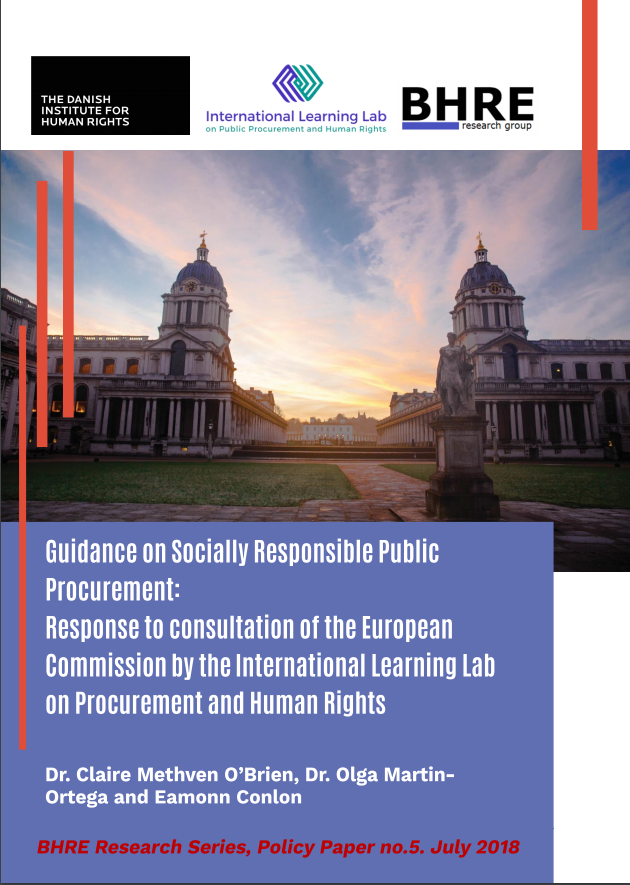Guidance on Socially Responsible Public Procurement: Response to consultation of the European Commission by the International Learning Lab on Procurement and Human Rights
/In July 2018 the Learning Lab submitted a response to a European Commission consultation on their Guidance on Socially Responsible Public Procurement. The submission was written by Dr. Claire Methven O’Brien, Dr. Olga Martin-Ortega and Eamonn Conlon on behalf of the Learning Lab and has now been published as BHRE Research Series Policy Paper n. 4. In this paper we propose a series of recommendations to the European Commission and suggest a new concept of Socially Responsible Public Procurement.
The Executive Summary highlights that:
The EU, EC and EU member states, as well as the UN, OECD and Council of Europe have committed to uphold the UNGPs, including in the public procurement context. Despite this, human rights dimensions of socially responsible public procurement (SRPP) have not so far been addressed in EU public procurement legislation policy or guidance:
- The European Union (EU) public procurement Directives and EU member state procurement laws and policies do not clearly define the human rights responsibilities of public bodies in connection with purchasing activities
- EU procurement laws and policies appear to have a ‘chilling effect’ on human rights and sustainability efforts by public buyers due to fear of legal challenges based on narrow interpretations of EU procurement rules relating to competition and equal treatment
- To the extent EU Public Procurement Directives refer to human rights concerns, these are defined restrictively with reference to ILO Core Labour Standards whereas reference should be made to all human rights acknowledged by the EU and the UNGPs
- Monitoring of conditions in government supply chains and remedy mechanisms for victims of human rights abuses by suppliers to public buyers in the EU are lacking
- There is a pressing need for guidance and capacity development support for EU public buyers on techniques and tools they can lawfully deploy to avoid or reduce the incidence of human rights abuses in the delivery of government contracts.
- Such guidance should address how public buyers may lawfully require suppliers to undertake human rights due diligence, how they should monitor their supplier’s performance in addressing human rights risks in the supply chain, and how and when they should apply sanctions to suppliers that fail to implement the ‘corporate responsibility to respect’ human rights.
A lack of EU policy coherence in relation to public procurement and human rights undermines the fulfilment of the state ‘duty to protect’ against business-related human rights abuses as well as efforts to promote responsible business conduct, inside the EU and beyond. Given the scale of
government spending, this presents a concrete and substantial threat to the realisation of the “decent work” agenda, the UNGPs and the Sustainable Development Goals, worldwide.
The Recommendations include:
EU public procurement laws and policies as well as government purchasing practices should safeguard human rights. They should further yield a competitive advantage to companies that practice human rights due diligence as a mechanism to advance their operation on a socially and environmentally sustainable basis.
To this end the European Commission (EC) should publish guidance on Socially Responsible Public Procurement (SRPP) that addresses the respective duties and responsibilities of public buyers and their suppliers for human rights in alignment with:
- Relevant European human rights standards including the European Convention on Human Rights and Charter of Fundamental Rights
- The UN Guiding Principles on Business and Human Rights (UNGPs)
- The 2030 Agenda for Sustainable Development and Sustainable Development Goals
- Relevant policy commitments of the EU, EC on business and human rights and sustainable development
- Relevant policy commitments of EU member states on business and human rights and sustainable development, such as those contained in National Action Plans (NAPs) on business and human rights
- Standards and guidance on supply chains and human rights including the OECD Guidelines for Multinational Enterprises (2011), OECD Due Diligence Guidance (2018), OECD sector specific due diligence guidance and ISO 20400 Sustainable Procurement Guidance.
A strategic objective of EC SRPP guidance should be to enhance the use of EU government buying to increase the practice of human rights due diligence by businesses, in line with the UNGPs and OECD Guidelines for MNEs, and hence to increase business respect for human rights.
The EC’s SRPP guidance should include:
1. A revised definition of socially responsible public procurement aligned to the UNGPs and OECD Guidelines for MNEs as well as EU law and EC policy commitments on business and human rights, according to which:
‘SRPP’ means procurement operations where human rights are respected and which promote sustainable development and responsible business conduct through the practice of risk-based supply chain due diligence to identify, prevent, mitigate and remedy potential and actual adverse impacts on human rights as well as environmental and social concerns.
SRPP operations may also seek to promote, for example, employment opportunities, decent work, compliance with social and labour rights, social inclusion (including persons with disabilities and migrant workers), equal opportunities, accessibility design for all and ethical trade, in addition to observing the principles enshrined in the Treaty for the European Union (TFEU) and the Procurement Directives.
According to this definition, SRPP includes public buyers integrating protection of internationally recognised human rights into all steps of their procurement processes as well as taking appropriate steps to ensure that their suppliers:
- avoid causing or contributing to human rights infringements in the performance of public contracts, and prevent and mitigate any such impacts;
- develop, implement and keep updated appropriate policies and procedures including: a company policy or other commitment to respect human rights; due diligence to identify, prevent, mitigate and account for how they address their impacts on human rights, and processes for remediation of adverse human rights impacts to which they cause or contribute.
2. A clear statement of the state duty to protect against business-related human rights abuses in the procurement context, indicating its non-discretionary character, and an exposition of its implications for the interpretation and practical application of the EU public procurement Directives.
3. A clear explanation of “human rights due diligence” as a standard of conduct expected of all businesses including government suppliers and their business partners.
4. Guidance on how to integrate human rights considerations into SRPP policies at national and local levels.
5. Practical guidelines for public buyers on how to make effective use of the scope provided by the 2014 EU Procurement Directives to integrate human rights considerations across the public procurement cycle, including planning, tendering, contract monitoring and evaluation phases.
6. Examples of good practices in integrating human rights into public procurement.
7. Case studies addressing a selection of high risk sectors for human rights abuses in the EU public procurement context, such as catering, food and agricultural supply and garments supply chain, electronics and construction.
8. Guidance on addressing perceived tensions between measures to protect human rights and other ‘primary’ or ‘secondary’ aims of public procurement, such as promoting the accessibility of public contracts to local and small and medium-sized enterprises (SMEs) or anti-corruption.
9. Finally, as the UNGPs are concerned to advance effective enjoyment of universally-recognised human rights, new EC SRPP guidance should clarify that appropriate measures to protect such rights serve to advance, rather than undermine, the achievement of a single procurement market.
The full report is available here.


